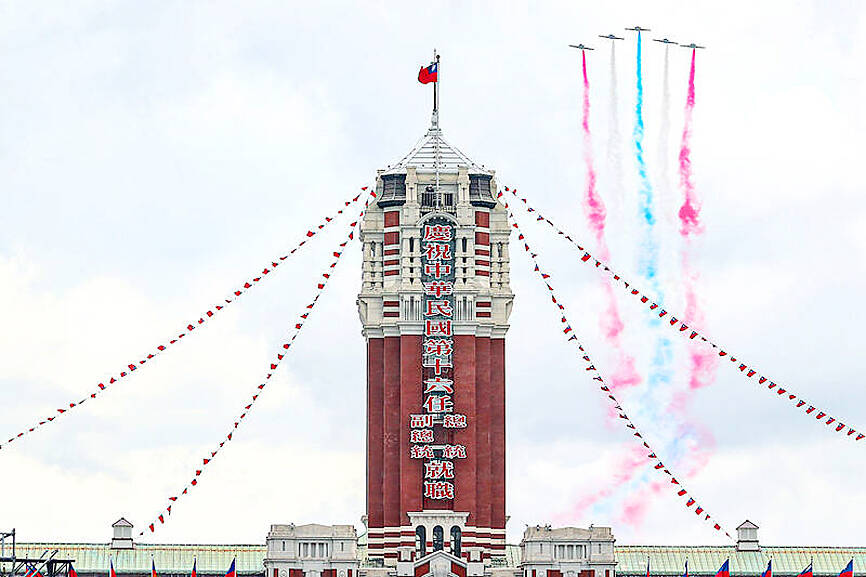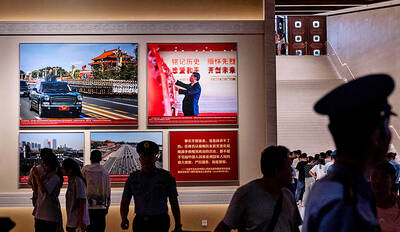The plans of Western governments to recognize Palestinian statehoodwhile failing to recognize Taiwan is hypocrisy, Vincent Chen (陳建志), a Taiwan Thinktank and Foundation for Future Generations advisory board member, said in an opinion piece published on Thursday by the Washington Post.
The stance of the Western states that have announced they would recognize Palestine confer legitimacy on something that “legally speaking, doesn’t yet exist” and they are “doing so to constrain Israel’s ability to intervene,” Chen said.
However, the West is not doing the same for Taipei regarding China, he said.

Photo: CNA
Taiwan meets the criteria of statehood, with a population of 23 million people, independent legislative, executive and judicial branches of government, a professional military, a national currency and representative offices in dozens of countries, Chen said, citing Article 1 of the Montevideo Convention.
Taiwan’s GDP is set to surpass US$800 billion, it has a Freedom House score of 94 out of 100, and its government is ranked 12th in the world for democratization and top in Asia, he said, adding that Taiwan is known for its international humanitarian, medical, educational and agricultural contributions.
By contrast, “insofar as a coherent Palestinian entity can be identified,” it is politically divided, unstable and has no defined borders, he said.
Since 2012 Palestine has held non-member observer status at the UN, while Taiwan is excluded from the UN system and forced to use the name “Chinese Taipei,” Chen said.
“By recognizing one entity and not the other, Western leaders are signaling to Beijing that their commitment to Taipei should not be taken too seriously,” he said.
That Western democracies do not recognize Taiwan reflects a “failure of political courage” and the hesitance stems not from doubts that Taiwan deserves recognition, but fear of “economic retaliation from China,” he said.
If China were to invade Taiwan and call it an “internal matter,” the West’s ability to oppose it from a legal and political standpoint would be hobbled, Chen said.
Protecting Taiwan is essential, as 90 percent of the world’s most advanced semiconductors — which are critical to military systems, artificial intelligence development, healthcare and global supply chains — are produced in Taiwan, he said.
Ambiguity on Taiwan’s status is “no longer geopolitically viable,” he said, citing the rising sentiment in Japan that “Taiwan’s security is Japan’s security,” as well as Canadian, German and French ships conducting freedom of navigation operations in the Taiwan Strait as examples of growing international support for the nation.
The US also backs Taiwan, he said.
US Secretary of Defense Pete Hegseth in May told the Shangri-La Dialogue in Singapore that “any attempt by communist China to conquer Taiwan by force would result in devastating consequences for the Indo-Pacific and the world,” Chen said.
Hegseth told the forum that “if deterrence fails ... we are prepared to do what the Department of Defense does best — fight and win — decisively,” Chen added.
If the international community can “consider recognizing as unqualified a candidate as Palestine,” surely it could “do the same for the far more developed democracy in Taiwan,” he said.

Three batches of banana sauce imported from the Philippines were intercepted at the border after they were found to contain the banned industrial dye Orange G, the Food and Drug Administration (FDA) said yesterday. From today through Sept. 2 next year, all seasoning sauces from the Philippines are to be subject to the FDA’s strictest border inspection, meaning 100 percent testing for illegal dyes before entry is allowed, it said in a statement. Orange G is an industrial coloring agent that is not permitted for food use in Taiwan or internationally, said Cheng Wei-chih (鄭維智), head of the FDA’s Northern Center for

The Chinese military has built landing bridge ships designed to expand its amphibious options for a potential assault on Taiwan, but their combat effectiveness is limited due to their high vulnerability, a defense expert said in an analysis published on Monday. Shen Ming-shih (沈明室), a research fellow at the Institute for National Defense and Security Research, said that the deployment of such vessels as part of the Chinese People’s Liberation Army (PLA) Navy’s East Sea Fleet signals a strong focus on Taiwan. However, the ships are highly vulnerable to precision strikes, which means they could be destroyed before they achieve their intended

About 4.2 million tourist arrivals were recorded in the first half of this year, a 10 percent increase from the same period last year, the Tourism Administration said yesterday. The growth continues to be consistent, with the fourth quarter of this year expected to be the peak in Taiwan, the agency said, adding that it plans to promote Taiwan overseas via partnerships and major events. From January to June, 9.14 million international departures were recorded from Taiwan, an 11 percent increase from the same period last year, with 3.3 million headed for Japan, 1.52 million for China and 832,962 to South Korea,

REWRITING HISTORY: China has been advocating a ‘correct’ interpretation of the victory over Japan that brings the CCP’s contributions to the forefront, an expert said An elderly Chinese war veteran’s shin still bears the mark of a bullet wound he sustained when fighting the Japanese as a teenager, a year before the end of World War II. Eighty years on, Li Jinshui’s scar remains as testimony to the bravery of Chinese troops in a conflict that killed millions of their people. However, the story behind China’s overthrow of the brutal Japanese occupation is deeply contested. Historians broadly agree that credit for victory lies primarily with the Chinese Nationalist Party (KMT)-led Republic of China (ROC) Army. Its leader, Chiang Kai-shek (蔣介石), fled to Taiwan in 1949 after losing a